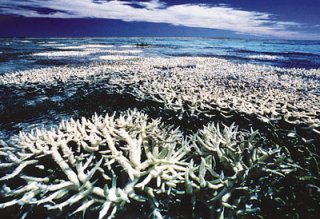(单词翻译:单击)
The experts from James Cook University (JCU) say it is the most extreme case of mass bleaching they have ever measured at the World Heritage Site. At least 35% of corals in the northern and central parts of Australia's Great Barrier Reef have been destroyed by bleaching.
来自詹姆斯·库克大学的专家近日表示,他们在已被列入世界自然遗产名录的大堡礁勘的探过程中发现了有史以来最严重的白化现象。澳洲大堡礁北部和中部的珊瑚至少有35%已被珊瑚白化现象摧毁。
Coral bleaching is caused by rising water temperatures resulting from two natural warm currents. It is exacerbated by man-made climate change, as the oceans are absorbing about 93% of the increase in the Earth's heat. Bleaching happens when corals under stress drive out the algae known as zooxanthellae that give them colour.
珊瑚白化是由于两个自然暖洋流汇聚导致水温升高而发生的。人类导致的气候变化令珊瑚白化情况更加糟糕,因为地球增加的热量的93%被大洋所吸收。海水变暖令珊瑚感到压力,导致为珊瑚提供色素的藻类被排走,从而使珊瑚白化。

"We found on average, that 35% of the corals are now dead or dying on 84 reefs that we surveyed along the northern and central sections of the Great Barrier Reef, between Townsville and Papua New Guinea," Professor Terry Hughes, the head of the ARC Centre of Excellence for Coral Reef Studies at JCU, said in a statement.
詹姆斯库克大学ARC珊瑚卓越研究中心主任特里·休斯表示:“根据我们对汤斯维尔和巴布亚新几内亚之间的大堡礁北部和中部84种珊瑚的调查,我们发现,平均来讲,35%的珊瑚现在已死亡或正在死亡”。
"This year is the third time in 18 years that the Great Barrier Reef has experienced mass bleaching due to global warming, and the current event is much more extreme than we've measured before. We're rapidly running out of time to reduce greenhouse gas emissions."
“由于全球变暖,这已是大堡礁在过去18年来第三次出现大规模的珊瑚白化现象。目前的状况比我们以前所了解的更为极端。减少温室气体排放,我们所剩时间已经不多了。”
The scientists warned that the recovery of coral cover is expected to take a decade or longer, but it would take much longer to regain the largest and oldest corals that have died.
科学家警告称,大堡礁珊瑚恢复生机大概需要十年或更长时间。不过,对那些已经死亡的最大和最老的珊瑚群来说,恢复生机要花费更长的时间。
Their study was released after months of intensive aerial and underwater surveys.
这项结果是在科学家进行了航拍、水下调查及长达数月的集中研究后发布的。


